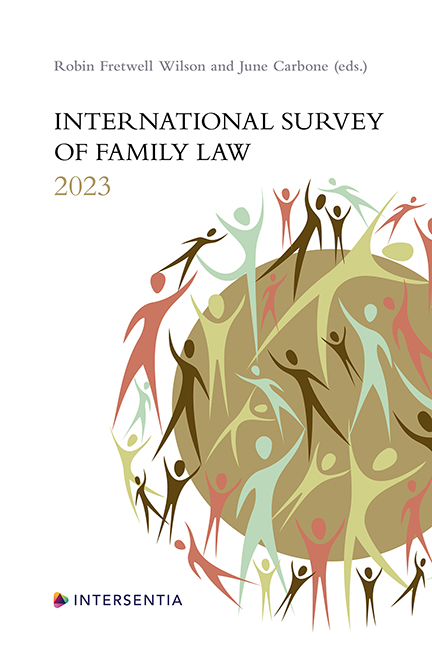France Some Reflections on 50 Years of Evolution of Family Law through the ‘Dejudiciarisation’ of French Family Law
Published online by Cambridge University Press: 03 April 2024
Summary
Résumé
Phénomène marquant du droit français de la famille au cours des trente dernières années, la déjudiciarisation témoigne des évolutions du droit contemporain de la famille. Elle accompagne la reconstruction du règles juridiques régissant la famille sur les droits et libertés de l’individu, une place de plus en plus importante étant donnée à l’autonomie personnelle. Elle traduit également le redéploiement de l’action de l’Etat qui transfère à d’autres acteurs, mais aussi aux intéressés euxmêmes à travers le contrat, le soin de réguler les relations familiales. Au-delà, elle conduit à s’interroger sur les nouvelles valeurs qui fondent le droit contemporain de la famille.
DEJUDICIARISATION
‘Dejudiciarisation’ is now one of the main phenomena of French family law. The movement is general, and the policies of dejudiciarisation have been adopted by all the governments that have succeeded in France over the last 30 years. It affects all family law, both property law and non-property law.
‘Dejudiciarisation’ means, in a very broad sense, the implementation of measures designed to avoid judicial intervention, or to avoid the settlement of disputes by judges themselves, in civil as well as in criminal matters, by favouring the search for a consensual solution, or by entrusting other actors, public or private, to do so. In this sense, dejudiciarisation differs from deregulation, which tends to allow means of regulation other than the law, and in particular State laws. As we will see, it is not because there is dejudiciarisation that there is necessarily deregulation. One might even be tempted to say that the family has never been subject to more legal rules than it is today; the law is everywhere in the family. But it is no longer the judge who will necessarily implement it or ensure its respect.
This is a significant change because, unlike in many countries, in France the judge had a central role in the family. As a representative of society, he ensured the protection of the interests of the most vulnerable people: children, those made vulnerable by age or health, women. He also ensured the protection of a certain social order. Of course, this role was not recognised without some reluctance. Family matters are, above all, private matters.
- Type
- Chapter
- Information
- International Survey of Family Law 2023 , pp. 143 - 150Publisher: IntersentiaPrint publication year: 2023



